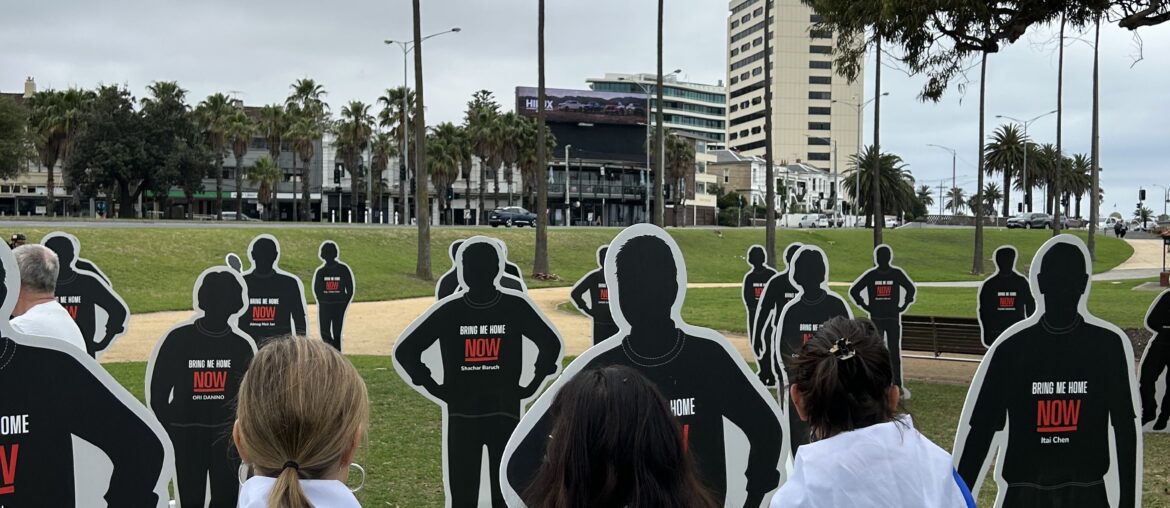Ever since October 7, our Jewish festivals have taken on new dimensions. Before anything, we think of the hostages. As we sit around the festive table with our families we are reminded of the empty seats at THEIR family tables.
Each festival has its own inherent meaning but they all connect us to the land of Israel, reminding us of our millenia-old yearning for the Jewish homeland. Given that many people are trying to deny this longstanding connection, it is especially poignant to remember how deeply embedded the land of Israel is in our texts, traditions and festivals.
So what does Shavuot mean for us today, in the context of our contemporary world, particularly after the tragedy of October 7? How do we connect the ancient significance of the festival with the struggles, triumphs and challenges that we face as a nation during wartime?
Shavuot is one of the most profound and meaningful festivals in the Jewish calendar. It marks the moment when the Jewish people received the Torah – the Ten Commandments – at Mount Sinai. This event, described in the Book of Exodus, marks not only the birth of the Jewish people as a nation but also the beginning of shared responsibility and shared destiny for Jews. The giving of the Torah transformed us from a group of refugees wandering in the desert to a people with a shared identity and purpose.
This notion of peoplehood is at the heart of Shavuot. What can we learn about peoplehood today?
The first hint comes from the language used by the Torah to describe the giving of the Ten Commandments. The Torah describes the Jewish people in singular form – ‘Vayichan sham neged hahar’ (‘And they camped (singular) there opposite the mountain’). The singular form is used because the people joined as one – unified – to accept the Ten Commandments. Even though they had been bickering and complaining, probably disagreeing about how to cross the Red Sea and whether or not they liked their leader, in THAT moment they became one.
Fast forward, and the Jewish people have so many different views, especially at this very moment in history. There are religious Jews, secular Jews, right wing, left wing, those who oppose the government of the day in Israel and those who support it. There are so many different protests on the streets of Tel Aviv and Jerusalem. It’s hard to observe the division in Israel, but it is also the beauty of Israel – that diverse views are seen as a strength, a reflection of its vibrant democracy. Across global Jewish communities, there are also diverse opinions about how to support Israel – which Jewish organisation should represent us, whether it’s okay to criticise the Israeli government from Australia, which synagogue to go to, and more.
However, with all these views that Jews hold, there is also a feeling of oneness, particularly in the Diaspora where Jews are so desperately clinging to each other for guidance, support and togetherness. Just like the Jewish people stood as one at Mount Sinai, the Jewish people today also feel as one – DESPITE their differences.
Shavuot teaches us that grappling with how to be the nation we became at Mt Sinai is a strength. Navigating ideas of justice, safety, security and our place in the world is a sign that we are working together, as one, to fulfil our purpose – even if it involves debate and disagreement.
The pain of October 7 is immense, and the trauma continues for Jews in Israel and around the world. But the solidarity we see within the Jewish community, both in Israel and around the world, is a testament to the power of peoplehood. Shavuot shows us that this solidarity is not just a reaction to a tragic event; it is the expression of a deep, ancient bond that has withstood the test of time. Our connection to one another, our commitment to each other’s wellbeing, the joy we share and the pain we feel as a collective, sustain us through the darkest of times.
So, this Shavuot I remind myself, and everyone who feels connected to the Jewish people, that even though things may seem very difficult and heavy right now,
the sadness you are feeling is peoplehood
the connection you are feeling is peoplehood
and even the pain you are feeling is peoplehood.
And carrying these emotions together feels far less burdensome when we are one. Shavuot reminds us that we are not alone. In the face of hatred, violence, and division, we are bound together by our shared history and our shared responsibility to one another.

